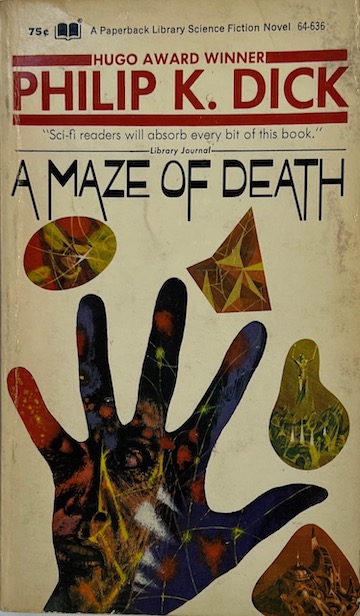Part 3 Philip K Dick 1971 Interview

James Holmes: Well, since you’ve written so many short stories, I guess we should probably just–
Philip K. Dick: A hundred and twenty two.
James Holmes: — concentrate more on the novels. Could you give us a brief resume of the novels that you’ve written?
Philip K. Dick: What does that mean?
James Holmes: Well, could you just tell us which ones, you know—which ones you’ve published of the novels.
Philip K. Dick: There are 28 of them. I can’t remember all that.
James Holmes: Wow! There are 28 novels?
Philip K. Dick: Or it is 27?
James Holmes: Starting in 1955, going to the present.
Philip K. Dick: Solar Lottery. Yeah, going right on through to A Maze of Death.
James Holmes: Which of those did you like best? There are 28 novels?
Philip K. Dick: Or it is 27?
James Holmes: Starting in 1955, going to the present.
Philip K. Dick: Solar Lottery. Yeah, going right on through to A Maze of Death.
James Holmes: Which of your novels did you like best?
Philip K. Dick: There were several that I liked best.
James Holmes: Which?
Philip K. Dick: How much time do I have?
James Holmes: You have probably two hours.
Philip K. Dick: Well, there were 28 of them that I like best.
[laughter]
Philip K. Dick: No, that’s not true. Some of them were terrible. Let me list the ones that were terrible first, they stick in my mind – The World Jones Made, that was the worst; Clans of the Alphane Moon, that was next to worst; The Man Who Japed, that was next; so on and so forth and so forth. There were about three good ones.
James Holmes: Which are the good ones in your opinion?
Philip K. Dick: I’m glad you inserted that clause. The Man in the High Castle, Dr. Bloodmoney, Martian Time-Slip. We have two hours and that’s about it right there.
James Holmes: Which of those– Well, which of all of the novels that you published sold best?
Philip K. Dick: The Man in the High Castle, as far as I know.
James Holmes: And, that’s the one that you received the Nebula Award for?
Philip K. Dick: Hugo Award.
James Holmes: The Hugo Award for, excuse me.
Philip K. Dick: Yes. By the way, that’s been in print for 10 years, which is unusual for paperback.
James Holmes: How many printings has it gone through?
Philip K. Dick: One printing.
James Holmes: One printing?
Philip K. Dick: That’s all one printing. Same cover, same number, same price. One printing. They just keep running it off.
James Holmes: Wow, that’s amazing!
Philip K. Dick: They pay royalties, though.
James Holmes: Do you think that The Man in the High Castle was your best book, the book that you’d like to be remembered by?
Philip K. Dick: Yes.
James Holmes: What were you trying to say in that book?
Philip K. Dick: Exactly what I said.
James Holmes: Which was?
Philip K. Dick: That things could be a lot worse than they are, and even if they were– That is in the book, it’s an alternate present in which Germany and Japan won World War II and sit on the west coast of California here with Japanese occupying this area, that even if were worse, that worse, it would still be livable, there would still be good people and good things would happen. It would still be viable.
James Holmes: Have you ever written for TV?
Philip K. Dick: Not scripts directly. I’ve had adaptations made.
James Holmes: Adaptations made? Do you get paid for adaptations?
Philip K. Dick: You bet your bippy!
James Holmes: Do you get paid well?
Philip K. Dick: No, usual.
James Holmes: The usual. What do you think of the adaptations that TV has made of your works?
Philip K. Dick: I never saw them.
James Holmes: Oh, you never saw them?
Philip K. Dick: I did do some radio script writing for the Mutual Broadcasting System, which I enjoyed very much, and I would have gone right on doing it except they cancelled not only that program, but all dramatic programs on the Mutual Broadcasting System. Just wiped them all out and put on funky music instead– Preparation H commercials, too. I really loved that. I really loved script writing. You write down–The way you do it, you write the name, you say George, and then after that in parentheses it says “loudly” or “softly” or “excruciatingly loudly” or something like that, or “subtly,” and then follows a line of corny dialogue like, “Don’t point that thing at me, you fool,” and that’s the way it looks on paper, and that’s the way a book comes out, but then when they read it over the radio, they put stuff in it. I mean, they put elan in it and verve, you know and stuff in it, and it’s really great. It’s fantastic! I mean, those guys, even the routine, you know– like these were mostly ex soap opera actor and actress types, you know, where the soap operas that support them, and they did a beautiful job on the stuff I wrote. I’ve played the tapes back many times. It’s amazing what they could do, and they were just technical technicians really, you know, functionaries of the station, probably getting paid about the same scale I was, and they did a beautiful job.
James Holmes: I don’t see a TV here in your room. Do you–
Philip K. Dick: That’s right.
James Holmes: Is that a statement of some kind on your part?
Philip K. Dick: No, that’s a statement on the part of other people who like TV sets better than I did. Well, no I won’t say they liked them better. They just liked mine better than I did. I wouldn’t even say that. They just got mine; that’s all.
James Holmes: They just took it?
Philip K. Dick: Well, it’s gone, anyway.
(Note: About a month before, his house had been broken into. The thieves ransacked the house taking some of PK Dick’s papers and the television set, He thought they were meth freaks thinking he must have something of value.)
James Holmes: You say you liked writing for radio a lot. Do you think radio is better than the current TV, let’s say?
Philip K. Dick: I don’t know because I don’t have a current TV.
James Holmes: [laughter]
Philip K. Dick: I would have written for TV, too, if I could have figured out which camera was camera 3 and camera 3. Camera 3, I believe, it projects downward from overheard, and if you write camera 3 and it’s really camera 2 that projects down, and camera 2 is over there, then the whole thing is shot from the standpoint of the bald head of the main actor and it’s all screwed up, so I never get it right.
James Holmes: Ah.
Philip K. Dick: I went back to, “Don’t point that thing at me, you fool!”
James Holmes: Over the years, how has your attitude towards your work changed?
Continued in:
Part 4 Philip K Dick 1971 Interview

